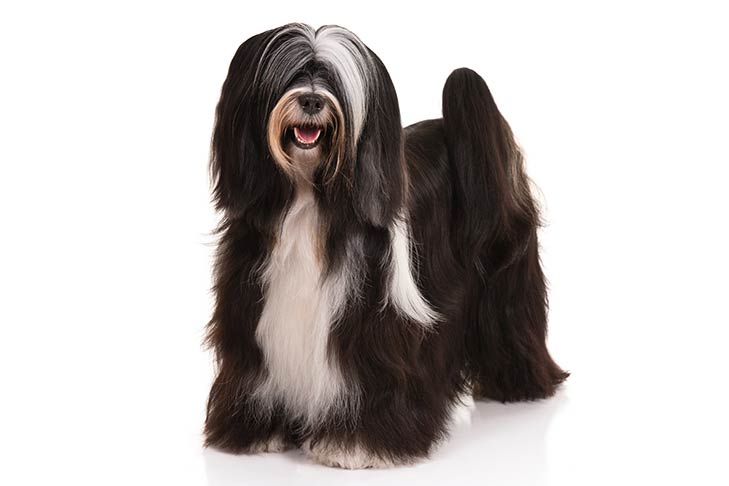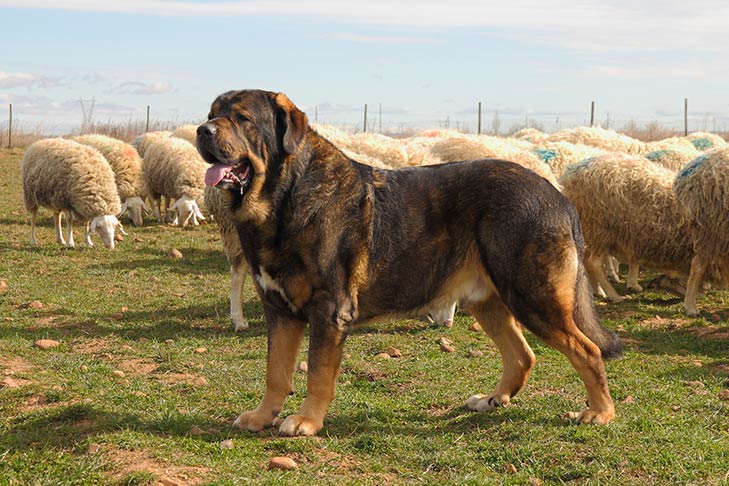Key Takeaways:
- Tibetan Mastiffs are large and powerful dogs, known for their impressive size and strength.
- They have a thick double coat that requires regular grooming to prevent matting and keep their fur healthy.
- Tibetan Mastiffs are independent and intelligent, but can also be stubborn, so early socialization and training is important.
- These dogs have a protective nature and make excellent guard dogs, but they require proper socialization to prevent aggression towards strangers.
- Tibetan Mastiffs thrive in spacious environments with plenty of exercise opportunities, but they are not recommended for apartment living due to their size and exercise needs.
Are you a dog lover looking to expand your knowledge of different breeds? Or perhaps you're considering getting a new furry friend and want to make an informed decision. Well, look no further! In this article, we will delve into the fascinating world of Tibetan Mastiffs – a breed known for their majestic appearance and loyal nature. By understanding the characteristics and care required for these magnificent dogs, you'll not only gain valuable insights into their unique qualities but also discover how to provide them with the love and attention they deserve. So, whether you're an avid dog enthusiast or just curious about this captivating breed, join us as we uncover the wonders of Tibetan Mastiffs and embark on a journey filled with wagging tails and unconditional love.
What is a Tibetan Mastiff and what makes it unique?
The Tibetan Mastiff: A Majestic Breed
The Tibetan Mastiff is a large and powerful dog breed that originated in Tibet. They are known for their impressive size, with males reaching heights of up to 26 inches at the shoulder and weighing between 90 to 150 pounds. Their thick double coat, which comes in various colors such as black, brown, and gold, provides them with protection from harsh weather conditions.
A Unique Combination of Strength and Loyalty
What sets the Tibetan Mastiff apart from other breeds is its unique combination of strength and loyalty. These dogs have been bred for centuries to guard livestock and property in the Himalayan region. Their natural instinct to protect makes them excellent guard dogs.
In addition to their protective nature, Tibetan Mastiffs are also known for their strong bond with their owners. They are fiercely loyal and will go to great lengths to protect their family members. This loyalty makes them wonderful companions for those who value a devoted and protective pet.
How big can a Tibetan Mastiff get, and where do they like to live?
An Impressive Size
Tibetan Mastiffs are one of the largest dog breeds in the world. Males typically stand at least 25 inches tall at the shoulder, while females are slightly smaller. When fully grown, these majestic dogs can weigh anywhere between 90 to 150 pounds.
A Preference for Cooler Climates
While Tibetan Mastiffs can adapt to various living environments, they have a preference for cooler climates due to their thick double coat. The breed originally hails from the Himalayan region where temperatures can be extremely cold. However, with proper care and attention, they can also thrive in warmer climates.
These dogs enjoy having access to a large outdoor space where they can roam freely. A securely fenced yard is ideal for them as it allows them to exercise and explore their surroundings. However, it's important to note that Tibetan Mastiffs are not well-suited for apartment living due to their size and need for ample space to move around.
How often should you groom a Tibetan Mastiff, and what do they need?
A Coat That Requires Regular Attention
Tibetan Mastiffs have a thick double coat that requires regular grooming to keep it healthy and tangle-free. It's recommended to brush their coat at least once or twice a week using a slicker brush or comb. This helps remove any loose hairs and prevents matting.
Additional Care Needs
- Tibetan Mastiffs also require regular nail trims to prevent overgrowth, which can be done every 4-6 weeks.
- Cleaning their ears on a weekly basis helps prevent infections.
- Regular dental care, such as brushing their teeth several times a week, is crucial for maintaining good oral hygiene.
Are Tibetan Mastiffs good with kids and other pets, or do they prefer to be alone?
A Protective Nature Towards Their Family
Tibetan Mastiffs are known for their protective nature towards their family members. They are generally good with kids when properly socialized from an early age. However, due to their large size and strong guarding instincts, supervision is always recommended when they interact with young children.
Potential Challenges with Other Pets
While Tibetan Mastiffs can get along well with other dogs and pets if introduced properly, their natural guarding instincts may lead to territorial behavior. Early socialization and training are essential in helping them develop positive relationships with other animals.
What kind of exercise does a Tibetan Mastiff need, and how much each day?
A Moderate Exercise Regimen
Tibetan Mastiffs require regular exercise to keep them physically and mentally stimulated. However, they are not overly active dogs compared to some other breeds. A moderate exercise regimen consisting of daily walks or playtime in a securely fenced yard is usually sufficient for them.
The Importance of Mental Stimulation
In addition to physical exercise, mental stimulation is crucial for the overall well-being of Tibetan Mastiffs. Engaging them in puzzle toys or obedience training sessions helps keep their minds sharp and prevents boredom.
Are there any health problems specific to Tibetan Mastiffs that owners should know about?
Potential Health Concerns
Like all dog breeds, Tibetan Mastiffs are prone to certain health issues that potential owners should be aware of. One common health concern in this breed is hip dysplasia, which is a condition where the hip joint doesn't develop properly. Regular check-ups with a veterinarian can help detect and manage such conditions early on.
Proper Nutrition and Weight Management
Tibetan Mastiffs have a tendency to gain weight easily, which can put additional stress on their joints. Feeding them a balanced diet and monitoring their weight through regular vet visits is important for maintaining their overall health.
How can you make sure your Tibetan Mastiff is happy and healthy through proper care and training?
A Happy and Healthy Companion
To ensure your Tibetan Mastiff is happy and healthy, it's important to provide them with proper care and training.
Key Tips for Care and Training
- Start socializing your Tibetan Mastiff from a young age to help them become well-adjusted and friendly towards people and other animals.
- Provide regular exercise and mental stimulation to keep them physically fit and mentally sharp.
- Establish a consistent routine for feeding, grooming, and exercise to provide stability in their lives.
- Attend obedience classes or work with a professional dog trainer to ensure they receive proper training and guidance.
- Show them love, patience, and consistent leadership to build a strong bond of trust between you and your Tibetan Mastiff.
In conclusion, the Tibetan Mastiff is a large and protective dog breed that requires proper care and attention. With their loyal nature and unique characteristics, they can make great companions for those willing to provide the necessary care and training.
Are Tibetan Mastiffs good house pets?
Tibetan Mastiffs are a great choice for families, as their natural protective instincts developed over many years make them highly devoted to their loved ones. These dogs are incredibly friendly and form strong bonds with children, especially when both the child and the dog are taught to take care of each other.
Are Tibetan Mastiff high maintenance?
Taking care of a Tibetan Mastiff breed involves moderate grooming due to its large size. Its double coat needs to be maintained throughout the year, with a shedding period occurring once annually during spring or summer. During this time, it is necessary to brush the dog daily for at least 30 minutes to remove any dead hair.
What is the personality of a Tibetan Mastiff?
The ancient Tibetan Mastiff is a powerful and imposing dog breed known for its protective nature. With its thick coat, this breed is calm and gentle within the home, displaying loyalty towards its family. However, it can be distant and protective when encountering unfamiliar individuals.
What to know about owning a Tibetan Mastiff?
Tibetan Mastiffs are highly protective of their owners and tend to be distant and territorial towards strangers. When properly trained, they are loyal, brave, and diligent. However, their strong sense of independence can sometimes lead them to disregard commands and not seek guidance from their owners.
What are the cons of having a Tibetan Mastiff?
Training these dogs can be difficult because they are highly intelligent and easily become bored with repetitive tasks. Unlike other breeds that are motivated by food rewards, these dogs are not as dependable in their response to this type of incentive.
Do Tibetan Mastiffs bark a lot?
Tibetan Mastiffs are often recognized for being vocal dogs because they are naturally protective and alert to potential intruders. If you are experiencing difficulties with excessive noise or barking, it is advisable to consult with a qualified behavior expert.















